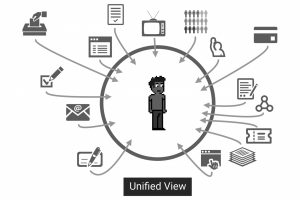Hussman School faculty member’s new book examines intersection of politics and technology

A newly released book by UNC Hussman School of Journalism and Media Associate Professor Daniel Kreiss offers an analysis of the role of technology, digital media, data and analytics in contemporary political campaigning.
“Prototype Politics: Technology-Intensive Campaigning and the Data of Democracy” — published by Oxford University Press as part of its studies in digital politics series — also explains why there are differences in the technological capacities of the Democratic and Republican parties.
“Daniel’s research gets to the heart of how the machinery of our democracy operates amid major technological shifts and a focus on leveraging data by political campaigns,” said Susan King, dean of the Hussman School. “This book provides essential background to understanding the 2016 election cycle.”
Kreiss joined the UNC faculty in July 2011 and teaches courses in research methods and political communication. Since that time, he has published more than two dozen scholarly works in edited volumes and journals including Political Communication, New Media and Society, the International Journal of Communication, Social Media and Society, and the Stanford Law Review, among others. His 2012 book, “Taking Our Country Back: The Crafting of Networked Politics from Howard Dean to Barack Obama,” told the previously untold history of how Howard Dean and his campaign shaped the technological future of the Democratic Party.
In the past year, Kreiss’s research has been featured in professional media outlets including The New York Times, The Wall Street Journal, The Washington Post, FiveThirtyEight, NPR, Politico, Wired, Time and Reuters.
In a recent Washington Post Monkey Cage article Kreiss wrote that data helps campaigns be more efficient and effective. “Data helps campaigns figure out which voters to contact, what to say and how best to reach them. Data helps campaigns more efficiently buy television and digital advertising to reach targeted groups of voters,” he wrote. “Data underlies message testing and the experiments that help campaigns figure out who is persuadable and what messages will persuade them. Data underlies the email and web design testing that can result in millions of additional dollars and volunteers.”
In “Prototype Politics,” Kreiss presents the first comprehensive dataset of 629 presidential primary and general election campaign tech staffers from the 2004 through 2012 presidential elections. Through an analysis of the careers of these staffers and the hiring patterns of parties and campaigns, as well as in-depth interviews with key practitioners, Kreiss argues that contemporary campaigning has entered a new technology-intensive era that the Democratic Party has engaged to not only gain traction against the Republicans, but to shape the new electoral context and define what electoral participation means in the 21st century.
The book details how and why the Democrats invested more in technology, were able to attract staffers with specialized expertise to work in electoral politics, and founded an array of firms to diffuse technological innovations down ballot and across election cycles. Kreiss also argues that scholars need to understand how technological development around politics happens in time and how the dynamics on display during presidential cycles are the outcome of longer processes.
Kreiss is scheduled to give book talks on the following dates:
Oct. 10, 2016
Konrad Adenauer Foundation’s International Conference for Political Communication
Berlin, Germany
Oct. 13, 2016
CUNY Graduate School of Journalism
New York City, New York
Dec. 1, 2016
Stanford Law School
Palo Alto, California
Feb. 2, 2017
Texas A&M University Department of Communication
College Station, Texas
Feb. 16, 2017
Hofstra University
Lawrence Herbert School of Communication
Department of Journalism, Media Studies, and Public Relations New York City, New York